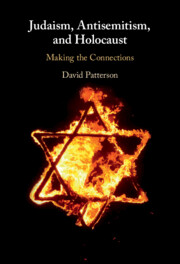Book contents
- Judaism, Antisemitism, and Holocaust
- Series page
- Judaism, Antisemitism, and Holocaust
- Copyright page
- Dedication
- Contents
- Preface
- Acknowledgments
- Introduction
- Part I Judaism
- Part II Antisemitism
- Part III Holocaust
- 9 The Philosophical Foundation of the Holocaust
- 10 Killing God
- 11 The Nazi Refashioning of the Image and the Likeness
- 12 The Recovery of a Name after the Assault on the Name
- Bibliography
- Index
9 - The Philosophical Foundation of the Holocaust
from Part III - Holocaust
Published online by Cambridge University Press: 24 March 2022
- Judaism, Antisemitism, and Holocaust
- Series page
- Judaism, Antisemitism, and Holocaust
- Copyright page
- Dedication
- Contents
- Preface
- Acknowledgments
- Introduction
- Part I Judaism
- Part II Antisemitism
- Part III Holocaust
- 9 The Philosophical Foundation of the Holocaust
- 10 Killing God
- 11 The Nazi Refashioning of the Image and the Likeness
- 12 The Recovery of a Name after the Assault on the Name
- Bibliography
- Index
Summary
This chapter shows how the modern thought that has shaped the current intellectual landscape played a role in the extermination of the Jews. Very often the millennial history of Christian antisemitism is blamed for the Holocaust. It is not so often, however, that the speculative philosophical tradition, particularly in the modern period, is taken to task. This chapter examines the ways in which the modern philosophical period is characterized by a process of thinking God out of the picture. From here Martin Heidegger emerges as the culmination of modern philosophical thought. Levinas has observed, “Heideggerian philosophy precisely marks the apogee of a thought in which the finite does not refer to the infinite … in which every deficiency is but weakness and every fault committed against oneself - the outcome of a long tradition of pride, heroism, domination, and cruelty. Heideggerian ontology subordinates the relation with the other to the relation with the neuter, Being, and it thus continues to exalt the will to power, whose legitimacy the other alone can unsettle, troubling good conscience.” This chapter demonstrates the truth of Levinas’s statement.
- Type
- Chapter
- Information
- Judaism, Antisemitism, and HolocaustMaking the Connections, pp. 187 - 204Publisher: Cambridge University PressPrint publication year: 2022

